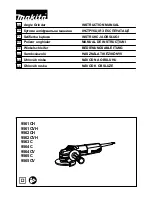
Starlet 50
30
meshing clearance between the bevel gears, as if under maximum load. Now check that the tail
rotor gearbox runs smoothly, with just detectable meshing clearance in the bevel gears.
If the play in the gears is too slight, i.e. the gears are stiff to move, you will need to remove the
drive assembly again and remove the shim washer under the bevel gear. If, however, there is
too much play in the gear meshing insert additional shim washers. If you work carefully, making
small adjustments, it is possible to set up the bevel gears so that they work freely but
without
backlash. Reinstall the unit, repeat the pulling procedure as described above, and you should
find that the gear meshing clearance is correct.
Note
: if you still cannot set the gear meshing clearance to your satisfaction, the problem may be
that the bevel gear on the tail rotor shaft is located too far outward due to manufacturing
tolerances, and is not engaging correctly with the bevel gear on the input shaft. If this is the
case, you will find that the tips of the teeth of the bevel gear 4618.41 are already fouling the
spacer sleeve 4450.28A, and yet there is backlash in the meshing clearance. In this case you
must fit the shim washers between the bevel gear 4618.38 and the bearing 4450.22, instead of
between the spacer sleeve and the bearing 4618.69, until the desired slight meshing clearance
is present.
Now remove both assemblies again, apply bearing retainer fluid, Order No. 951, to the bearings,
the setscrews, and the bevel gear on the input shaft, re-fit them on the tail rotor shaft and the
input shaft, and assemble the parts permanently.
Fit a 3 mm Ø washer on the M3 x 22 socket-head cap screw, followed by the tail rotor bellcrank
4618.60.
Check that the bellcrank rotates freely on the screw. If necessary de-burr the bore of the bell-
crank and lubricate it with silicone oil. With the bellcrank on the screw, fit the screw in the hole in
the shoulder of the tail rotor housing and tighten it by a few turns; do not secure it permanently
at this stage because the control bridge, which is described in the next section, must first be
installed.
















































